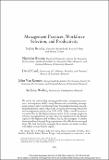Management Practices, Workforce Selection, and Productivity
Author(s)
Bender, Stefan; Card, David; Wolter, Stefanie; Bloom, Nicholas; Van Reenen, John Michael
Download694107.pdf (782.4Kb)
PUBLISHER_POLICY
Publisher Policy
Article is made available in accordance with the publisher's policy and may be subject to US copyright law. Please refer to the publisher's site for terms of use.
Terms of use
Metadata
Show full item recordAbstract
We study the relationship among productivity, management practices, and employee ability using German data combining management practices surveys with employees’ longitudinal earnings records. Including human capital reduces the association between productivity and management practices by 30% – 50%. Only a small fraction is accounted for by the higher human capital of the average employee at better-managed firms. A larger share is attributable to the human capital of the highest-paid workers, that is, the managers. A similar share is mediated through the pay premiums offered by better-managed firms. We find that better-managed firms recruit and retain workers with higher average human capital.
Date issued
2018-01Department
Massachusetts Institute of Technology. Department of Economics; Sloan School of ManagementJournal
Journal of Labor Economics
Publisher
University of Chicago Press
Citation
Bender, Stefan, Nicholas Bloom, David Card, John Van Reenen, and Stefanie Wolter. “Management Practices, Workforce Selection, and Productivity.” Journal of Labor Economics 36, no. S1 (January 2, 2018): S371–S409.
Version: Final published version
ISSN
0734-306X
1537-5307